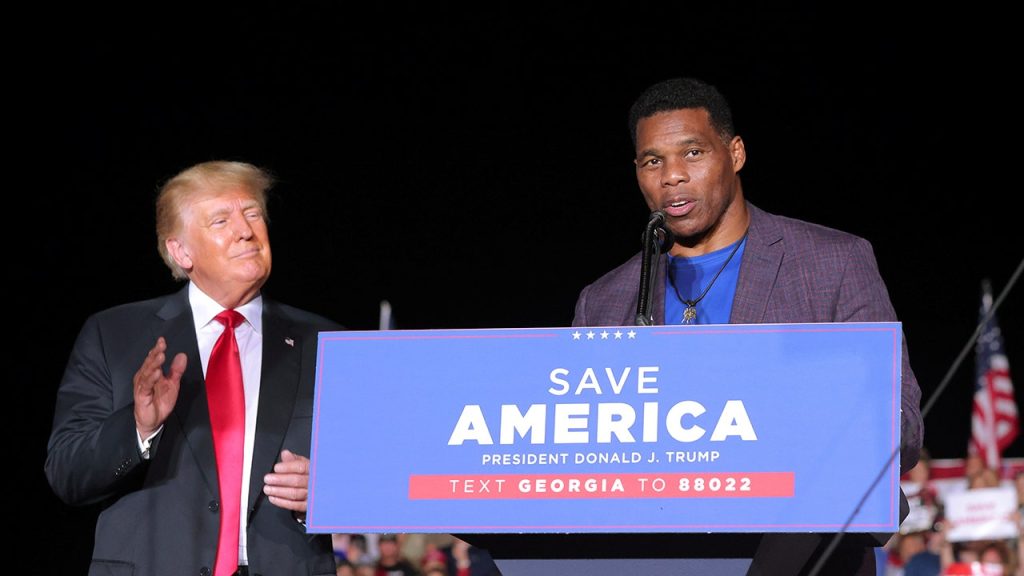Donald Trump’s post-presidency continues to be marked by a blend of political maneuvering and personal loyalty, a pattern exemplified by his recent nomination of Herschel Walker as U.S. ambassador to the Bahamas. This appointment marks a new chapter in the intertwined narratives of the two men, a relationship forged in the competitive arena of professional football and solidified through years of political alliance. Walker, a Heisman Trophy winner and former NFL star, first entered Trump’s orbit as a player for the New Jersey Generals, a team owned by Trump in the now-defunct USFL. This initial connection evolved into a close friendship and political partnership, with Walker becoming a vocal supporter of Trump’s presidential campaigns and political agenda. The nomination to the ambassadorship follows Walker’s unsuccessful bid for a Georgia Senate seat in 2022, a race heavily influenced by Trump’s endorsement.
The appointment of Walker, a figure with limited diplomatic experience, underscores Trump’s tendency to prioritize personal loyalty and political considerations over traditional qualifications. While Trump cited Walker’s work with the President’s Council on Sports, Fitness, and Nutrition, and his broader engagement with youth, military personnel, and athletes, critics point to Walker’s lack of experience in foreign policy and international relations. The nomination echoes Trump’s previous selection of other defeated Georgia Senate candidates, David Perdue and Kelly Loeffler, for prominent positions in his prospective second administration, further highlighting his inclination towards rewarding loyalists.
Walker’s Senate campaign, though ultimately unsuccessful, served as a high-profile platform for his political debut. Backed by Trump’s endorsement, Walker entered the race amidst considerable fanfare, but his campaign was plagued by controversy. Allegations regarding his personal life and business dealings, coupled with often-controversial public statements, became focal points of the campaign, ultimately contributing to his narrow defeat against incumbent Democrat Raphael Warnock. Despite the loss, Walker’s campaign solidified his position as a prominent figure within the Trump-aligned wing of the Republican party.
The ambassadorship to the Bahamas, while a significant diplomatic post, is often viewed as less demanding than other ambassadorial roles. The Bahamas, a close U.S. neighbor with strong economic and tourism ties to the United States, presents a relatively stable diplomatic environment. This arguably makes it a suitable posting for an individual with limited diplomatic experience, allowing Walker to learn the ropes of international relations while navigating less complex geopolitical challenges. The appointment also provides Walker with a platform to continue his public service, albeit in a different capacity than his initially envisioned Senate role.
Trump’s decision to nominate Walker can be interpreted through multiple lenses. It can be seen as a reward for Walker’s loyalty and support, offering him a prestigious position despite his electoral defeat. It also serves as a demonstration of Trump’s continuing influence within the Republican party, even out of office. By appointing loyalists to key positions, Trump maintains a network of influence and solidifies his position as a kingmaker within the GOP. Conversely, the nomination can also be viewed as a controversial move, potentially undermining the importance of diplomatic experience and expertise in ambassadorial appointments.
The appointment of Herschel Walker as ambassador to the Bahamas encapsulates several key themes of the Trump era in American politics: the blurring of lines between personal loyalty and political appointments, the prioritization of political considerations over traditional qualifications, and the enduring influence of Trump within the Republican party. Whether this appointment proves to be a successful transition for Walker from the gridiron to the diplomatic arena remains to be seen. However, it undoubtedly adds another intriguing chapter to the interwoven stories of Donald Trump and Herschel Walker, two figures whose paths have been intertwined for decades, from the football field to the political arena and now to the realm of international diplomacy. The nomination also underscores the ongoing debate over the appropriate balance between political loyalty and professional qualifications in government appointments, a debate that is likely to continue shaping the landscape of American politics for years to come.

